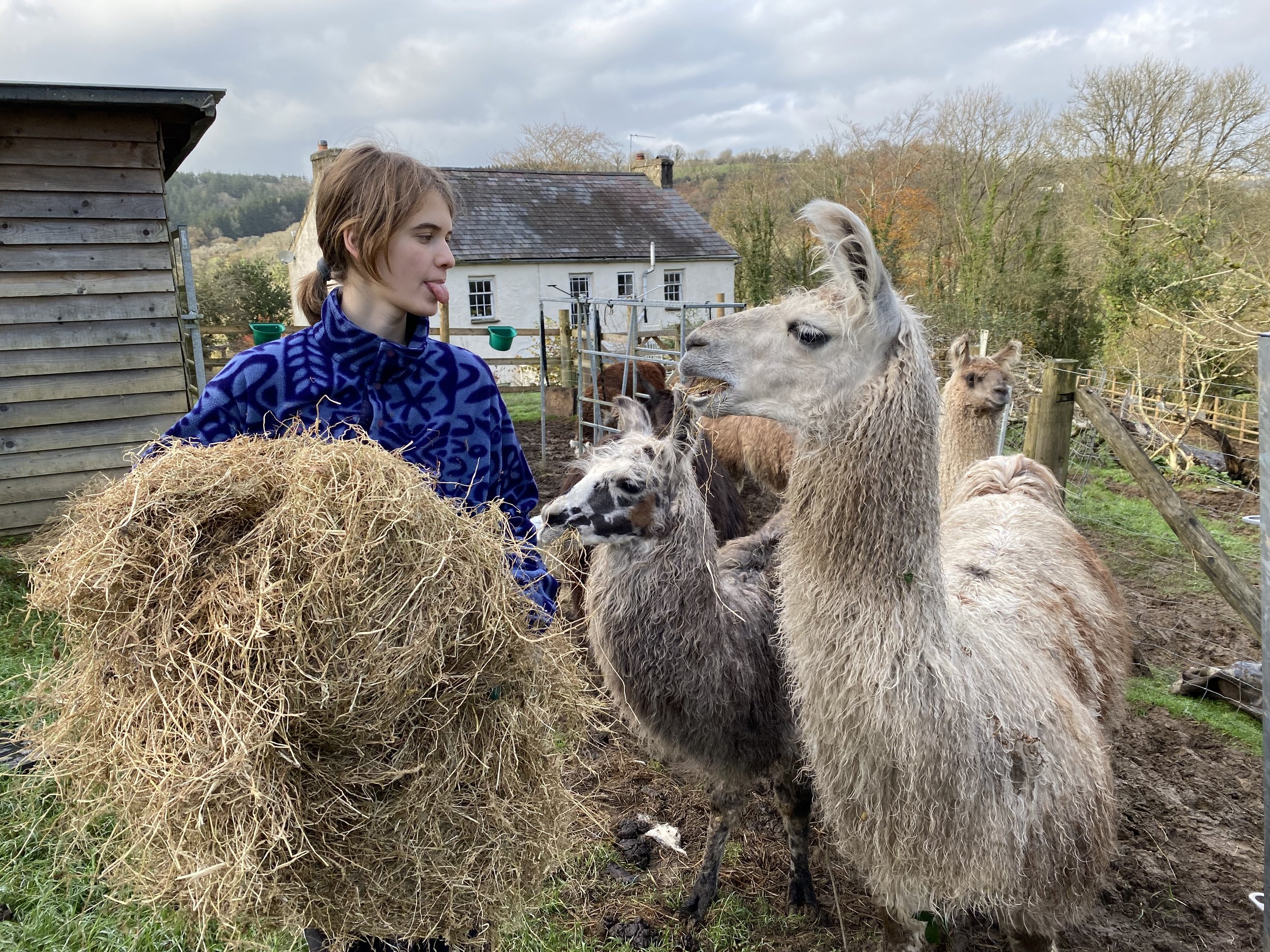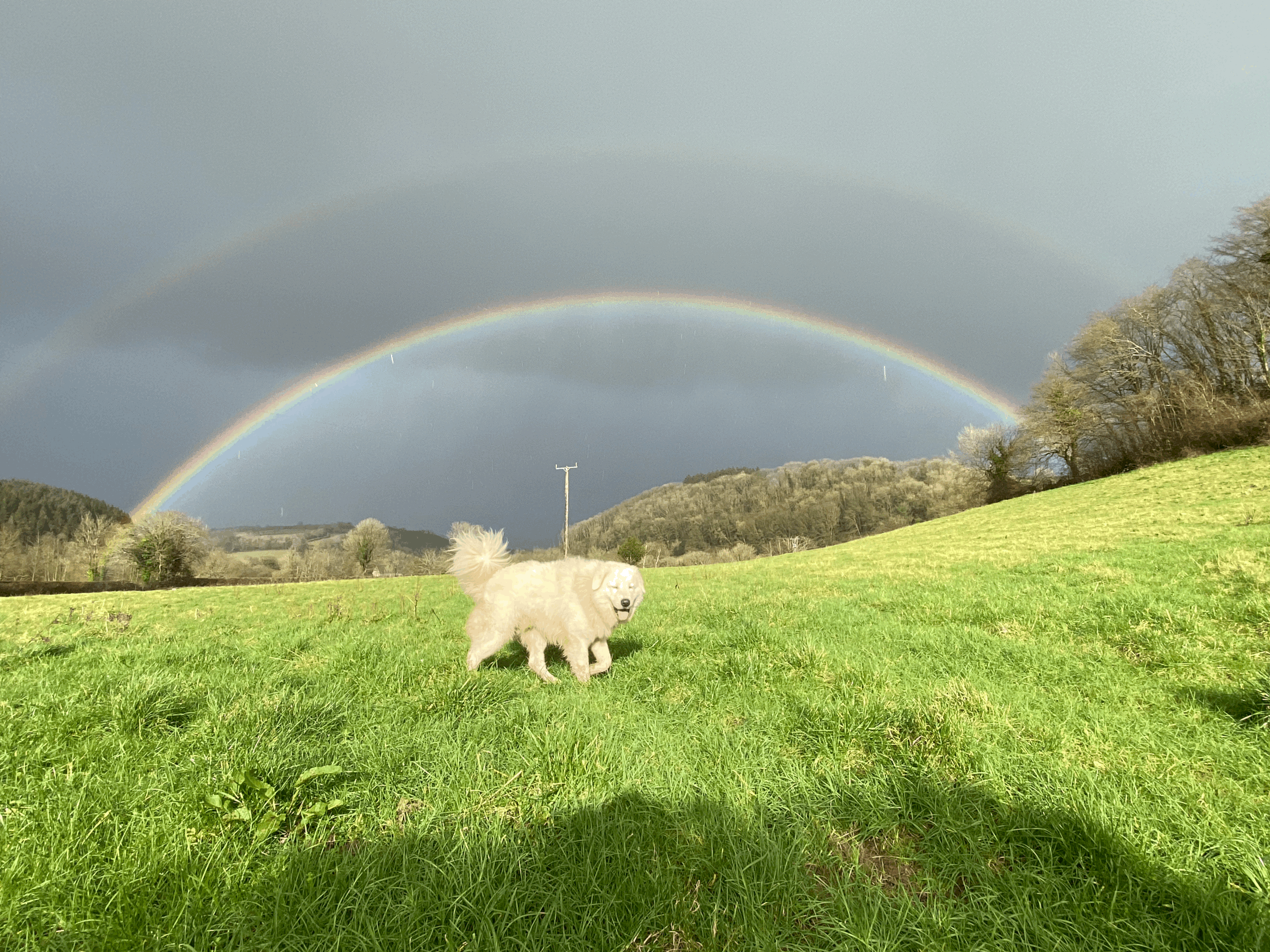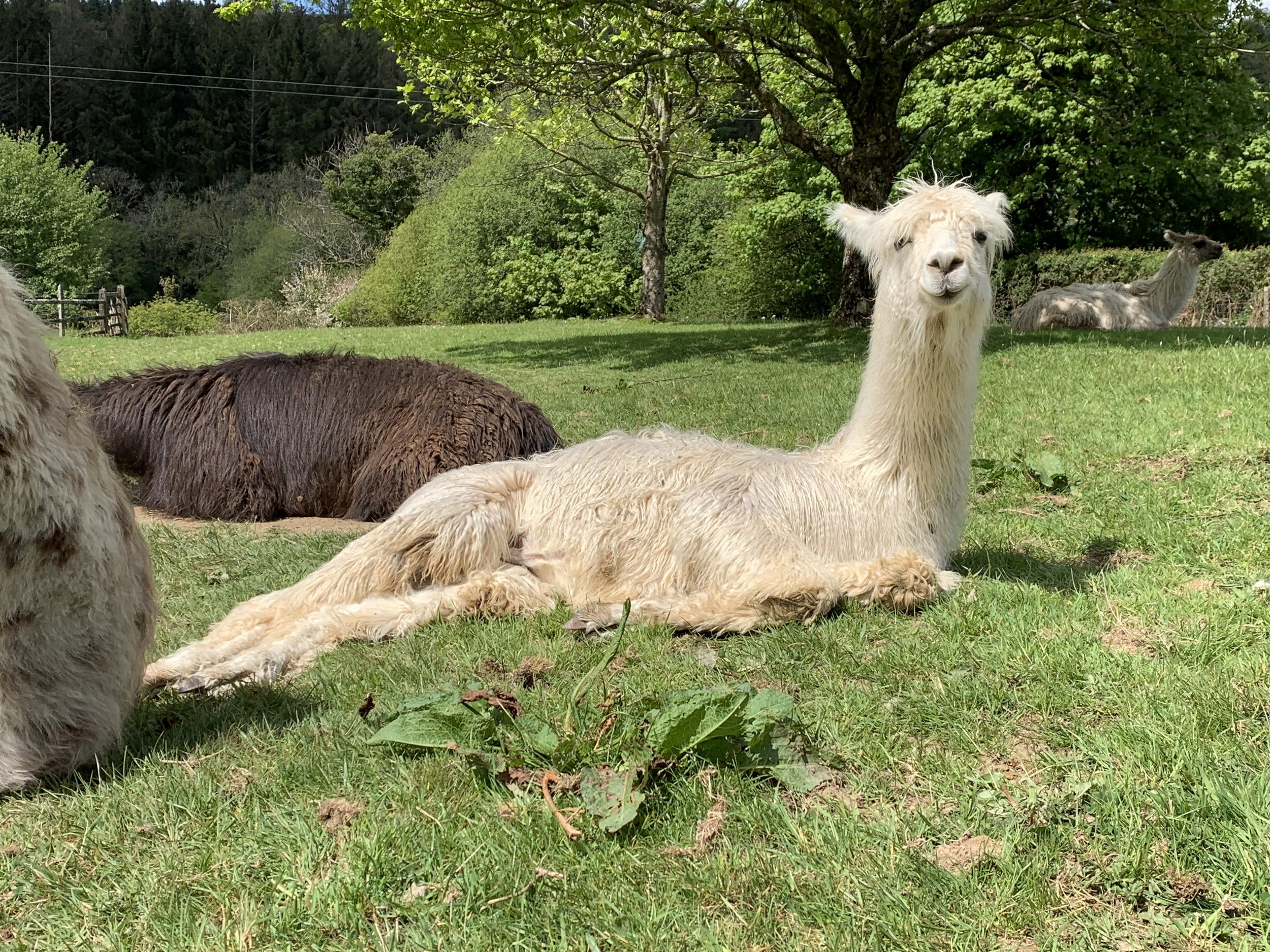
Llama Trekking Frequently Asked Questions
Children
Q. My child is [enter age]. Can they come on the llama trek? Can they walk a llama?
Customers must be 16 years or older to walk their own llama.
Children younger than 16 can share a llama with an adult (i.e. the adult holds the llama’s lead at the same time as the child).
Llamas are large strong animals that stand 1.8m (6 foot) and can weigh 200kg (450lbs) when mature.
Children under 16 are welcome to attend the walk without a llama (i.e. someone else in your party walks the llama).
Not suitable for young children unless they are good walkers (the trek route is approximately three miles and takes on average two hours to complete).
Q. My child is [enter age]. Can they do the walk by themselves or do I need to accompany them?
A paying adult will need to attend for each child under 16 that wants to walk a llama.
We don’t recommend allowing your children to wander off into the woods unsupervised with strange llamas that you have never met before :)
Customers must be 16 years or older to walk their own llama.
Children younger than 16 can share a llama with an adult (i.e. the adult holds the llama’s lead at the same time as the child).
Llamas are large strong animals that stand 1.8m (6 foot) and can weigh 200kg (450lbs) when mature.
Not suitable for young children unless they are good walkers (the trek route is approximately three miles and takes on average two hours to complete).
How do I book?
You can book online by clicking here.
How much does it cost?
£45 per person to walk with a llama
£30 per person to walk without a llama
£30 per child under 16 (i.e. without a llama)
Free for babies / non-walking children (be prepared to carry them for approximately three miles. Consider whether your child will be satisified to be carried / in a carrier for this amount of time).
Not recommended for toddlers as the llama trek is approximately three miles long and we are unable to wait for you as most treks have multiple groups of customers.
The llama trek route is not suitable for push chairs, buggies, or budgies.
Weather
Q. It is really wet / windy / hot / cold / raining / thundery / snowing - is the llama trek still happening?
A. Treks take place in all weather conditions. Being in West Wales, it is known to rain occasionally. However, we are based in a valley and receive shelter from the Preseli Hills. We are fortunate therefore not to get as much bad weather as other parts of Pembrokeshire. We often get so little rain that we have renamed the area ‘The Valley of Eternal Sunshine’.
However, it IS still possible that there will be rain on your trek. The llamas are fine with this – it cools them down under their big thick coats. You should come dressed appropriately for the forecast.
If there are weather warnings, or if it is likely to be absolutely pouring all day, then we will contact you to reschedule the trek. Whilst we will venture out in light rain and medium showers, high winds are absolutely not acceptable in any circumstances since we walk through woods and under many trees on the trek, so we don’t want any branches or trees coming down on llamas or people!
In the summertime, we may occasionally have to cancel treks due to it being TOO HOT. Whilst llamas are fine in rain, they cannot tolerate high temperatures with their thick heavy coats – even when sheared (which we do in May in readiness for hot Summers).
In summary, if we feel that the health and safety of either the llamas or our customers could be jeopardised, we will contact you to reschedule the trek. If you do not hear from us, then the trek will still be taking place. Please do not assume that the trek is not taking place if you have not heard from us. If in doubt, email us and we can advise on the current situation.
Q. My llama trekking voucher has expired, can it be extended?
A. It certainly can! For an admin fee of £20, you can extend the voucher for another three months. You can extend it for even longer by increasing the quantity i.e. £40 will extend the voucher for six months. £20 is the minimum extension time - we need to charge this to cover the associated administrative costs.
No dogs on the farm or on llama treks

Q. I have a dog that is ultra well-behaved and never causes any trouble. Can I bring it to your farm or on the llama trek?
A. No.
Long Answer: sorry - no dogs on site or on llama treks. There are several reasons for this rule:
We have our own guard dog on the farm - a livestock guardian dog. As this name implies, his job is to guard the livestock on the farm from predators. Our dog will see your dog as a predator and a threat to his livestock, and therefore attack your dog. Livestock guardian dogs work differently to other dogs - they are a ‘primitive’ breed and have an innate drive to protect their livestock. They won’t necessarily listen to human commands - they have been bred for millenia to be independent thinkers in order for them to effectively perform their job. As you may have seen from our social media pages, our dog is HUGE and VAST and takes his job very seriously. He will not think twice about dispatching any customer dog whose owner is foolish enough to bring it on to the farm. PLEASE leave your dog at home, as it won’t end well for anyone. We get enough animal drama here on a daily basis and really don’t want to watch our dog try to pass the remains of your dog through his digestive system.
We keep poultry, waterfowl and other prey animals on the farm. Even if your dog is the bestest behaved canine ever to have walked the earth, our animals can still become stressed as a result of the proximity of your dog, which regardless of breed or temperament, is still seen as a predator by prey animals, out to eat them. We always put the welfare of our animals first, so regrettably we cannot have any dogs that are unknown to us or our animals on site. On a related note, most dog owners will not be in the habit of taking their pet onto farms regularly, so they will not be able to predict how their animal will behave when confronted with a flock of strange birds, a small herd of cats, or a giant pig capable of swallowing dogs whole.
Our llamas are used to dogs. They are tough llamas. They aren’t bothered by dogs. You may be aware that some llamas are used as guards to protect other livestock, such as sheep or chickens. In such scenarios llamas have been known to kick and trample foxes and other canines to death. Whilst it is unlikely that our llamas would ever do that to a well behaved dog, all animals can be unpredictable and react in ways that their humans would never in a million years envisage. Animals have subtle body language and behaviour which humans cannot always pick up on easily, and it only takes a second for something to go wrong. Your dog might only have to look at our llamas the wrong way for them to take offence!
Our llamas frequently encounter our neighbours dogs on treks. They’re used to dogs. They grew up with dogs. However it is unlikely that your dog grew up with llamas, and has probably never seen a llama. Therefore it is impossible to predict how your dog will react if it is forced to stay in close proximity to a large group of llamas for long periods of time (spoiler: common outcome - barking. Lots of barking. Infinite barking. Complaints from everyone else on the llama trek).
As mentioned previously, many of our neighbours in the valley have dogs, and we will walk past their houses whilst on the llama trek. These are big butch farm dogs, and they don’t take kindly to strange dogs walking past their front gates. The last thing we want on a llama trek is dog drama!
Please DO NOT leave your dog in your car whilst you are on a llama trek. The welfare of all animals on our farm is our highest priority, and this will include any animals in your vehicle while it is parked on our property. We (and our livestock) do not wish to listen to your dog barking / howling / yelping for two hours whilst you are out walking with llamas. Should it come to our attention that any animal has been left in a customer vehicle on our premises, we reserve the right to insist you reschedule your visit / llama trek. If you have already left on a llama trek and our staff find an animal in your vehicle, we reserve the right to liberate the animal from the vehicle on welfare grounds, and / or notify the appropriate authorities.
Farm Visits

Farm Visits
Q. Can we come and visit / look / take pictures / draw your llamas? We don’t want to walk them!
As we are a working farm, we cannot accept unscheduled visits - all customers must book in advance via our website or email. We have potentially dangerous animals (not the llamas!) roaming free range on site that will eat unscheduled visitors. All animals are housed securely during visits where customers have booked and paid in advance.
We appreciate that there is a healthy demand for general farm visits, especially from potential customers with children. However, we have our own children, and don’t necessarily want any more of them roaming around the farm. As noted above, we are a working farm, with plenty of potential hazards for little people such as steep drops, historical barbed wire, electric fencing, livestock guardian dogs, aggressive roosters etc.
We have previously considered allowing farm visits on multiple occassions, and have debated the merits for a long time. However we have always felt we cannot provide sufficient value to potential customers. We have a very limited range of animals here. Our customer facilities are basic and we are not geared up to be a ‘farm park’ - we focus on llama trekking, the traditional use for llamas. No food or drink is available on site. Opening up the farm to general visits - whilst charging a price to make it a worthwhile business venture - would no doubt leave customers feeling underwhelmed, financially exploited, and inevitably lead to a wealth of dissatisfied online reviews.
Instead of general farm visits, we offer:
Llama treks - a walk with a llama around the valley for approximately two hours.
Farm stays - stay in our log cabin (The Llama Lodge) with the llamas right outside your window.
Group visits - an onsite llama talk and farm tour for groups (minimum of ten people).
Llama walks can be booked via our website www.llamas.wales - hit the big blue ‘book now’ button.
Farm stays and group visits can be booked via email.
Q. Pwwweeeeeeease can we just come and look at your llamas? We’ll pay!
No.
Please see answer above.
And to add to those comments, we will emphasise again: we are a working farm, which means we are working on the farm. There are always a million jobs that urgently need completing here. We simply do not have the time to entertain visitors outside scheduled llama trek slots, or to supervise visitors to ensure their safety on the farm. We absolutely appreciate your custom and interest, but unfortunately we have to limit customer numbers to scheduled trek times to ensure customer safety and our own quality of life. Thank you for respecting the farm rules.
Can I buy llamas from you?

No.
We don’t sell llamas. If we were to breed any animal, we would not feel comfortable selling it to make profit. On a related note, we do not breed or raise any animals for meat.
If you are interested in purchasing llamas, your best bet is to sign up to The British Llama Society (BLS), who can put you in touch with experienced breeders, and also teach you the unique care requirements for llamas. Please make sure you research basic llama care and do not make any spontaneous purchases - there are far too many llamas that suffer from badly informed owners who did not realise what care these animals require prior to buying them, because they never stopped to consider what they were purchasing and how it may differ from other animals. A llama is not a dog / cat / chicken / goat / horse / cow / pig / goldfish / hamster. Please do note assume you are in a position to care for a llama or even worse - entertain lofty ideas about breedings llamas - before first doing some informed research and speaking with experienced owners. BLS is your first stop!
BLS website: www.britishllamasociety.co.uk
Minimum number of llamas
Note that you will need to keep at least two llamas at a minimum - three ideally. They are herd animals and do not do well on their own. We are very skeptical of claims from people who keep llamas with alpacas / donkeys / horses / sheep / pigs / whatever who say ‘they get on great!’. While this may be true, they need other members of their own species to really prosper. How would you like it if you were stuck in a pen with pigs and didn’t have access to any other human beings?
Whilst you will need 2/3 llamas at a minimum, we have noted from our experiences that llamas become more confident and prosper in larger numbers. Between 6-10 is the ideal minimum in our personal view.
How much space do I need to keep llamas?
We would recommend several acres minimum. Whilst it is commonly said that 4 llamas can be kept on an acre, this does not take into account stock rotation i.e. where are you going to put your llamas once they have eaten all the grass in the field? (and they will do this quickly).
You need at least a second field to move them to, to allow the first field to recover, for the grass to grow back, and for the parasite load (from llama waste) to drop over time.
We would recommend at least a three field rotation, of at least an acre each, to allow adequate grazing and time for the pasture to recover. And this does not take into account one of the golden rules of farming: not all land is equal. A north facing 45 degree slope will not offer the same grazing opportunities as a flat, well drained field with good exposure to southern sun. Consider your soil type also. Heavy clay takes a long time to drain in the winter, which means that large animals like llamas will churn up the field very quickly and turn it into a bog. This will result in very little grass growing, and there will be very little for your llamas to eat.
Also take into account that unless you have vast hectares of grazing, you will very likely need to supplement your llamas feed for around 6 months of the year in the UK with hay, since it will be too cold for grass to grow, or it won’t grow quickly enough. The cost of daily hay feeding adds up rapidly so keep this in mind when considering your budget for keeping llamas.
Don’t keep girl and boy llamas together.
Do not breed llamas unless you have facilities to keep them separate at all times
Male llamas will attempt to breed with female llamas regularly if they are kept in the same enclosure. Even neutered males will attempt to breed with females. Irresponsible owners keep both sexes together and will claim to have never seen their male(s) attempt to mate with the females. This is because they tend to do it in the middle of the night when their owner is asleep.
Without going into detail, the nature of male llama reproductive anatomy can do serious internal damage to female llamas with repeat breedings, to the point of making them infertile or causing serious health issues, possibly death.
If you are planning on keeping both sexes together permanently, you are being irresponsible and endangering your females lives. Whether your llamas will be neutered or not is besides the point.
If you do have adequate facilities to house your males and females separately for most of the time (asides from controlled supervised matings), then you should also consider how you will house any potential offspring - given that father llamas will at some point take an interest in their daughters, and sons will at some point start taking an interest in their mothers. They will need to be housed separately in order to negate any inbreeding.
